Technology for very young children
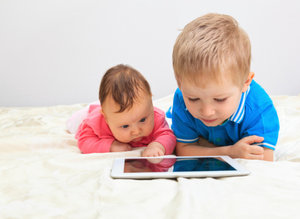
I’ve never been one to shy away from technology and you’ll often find me tweeting about the usefulness of different apps and websites for the language classroom or blogging about Youtube videos that we can use or the use of online corpora. I would give teacher training sessions encouraging teachers to use mobile devices and social networking sites with their students and secretly mock those having trouble with moving with the times. I would show my trainees this video to make my point that change may be difficult, but it is inevitable and we have to join the ‘digital natives’ in this game of ‘tech-catchup’.
But I’m now a mother of a one-year-old, and everyday, I’m faced with the decision of how much screen time to expose my daughter to.
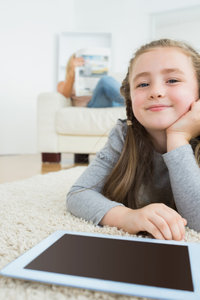 We went on our first family holiday a few weeks ago to a resort in Spain and I couldn’t help but notice the number of families who had tablets at the dinner table to either bribe their children into eating or keep their children quiet so that they could enjoy the meal themselves. I was instantly reminded of friends who rely on screens to make long car journeys with their kids more manageable and friends of friends who plop their children in front of the TV for hours on end simply because it is convenient and easy. Afterall, TV programmes, apps, and the games on tablets are educational, so what’s the harm, right?
We went on our first family holiday a few weeks ago to a resort in Spain and I couldn’t help but notice the number of families who had tablets at the dinner table to either bribe their children into eating or keep their children quiet so that they could enjoy the meal themselves. I was instantly reminded of friends who rely on screens to make long car journeys with their kids more manageable and friends of friends who plop their children in front of the TV for hours on end simply because it is convenient and easy. Afterall, TV programmes, apps, and the games on tablets are educational, so what’s the harm, right?
Despite being pro-technology and a big believer in the educational benefits brought about by these screens, I couldn’t help feeling disturbed by the over-reliance on screens and the negative effects of over-exposure. I could hear my mother’s voice going, “Don’t watch too much TV,” “Don’t stand so close to the TV,” “Stop staring at the screen and swallow your food!”
But in the year 2014, we don’t just have television and television programmes to contend with. We now have mobile devices like smart phones and tablets, programmes like Skype and FaceTime, games like Minecraft and Cooking Mama, apps like Disney Junior Play and Peppa Pig’s Holiday, and YouTube videos of every nursery rhyme and every children’s story you can think of accompanied by the coolest animation. Even the BBC’s children’s channel CBeebies have their own apps that are downloadable for free and constantly top the iTunes charts. To simply deliver a blanket ban on technology in the home would be difficult and as impractical and inconvenient as shooting oneself in the foot.
So how can we make an intelligent decision?
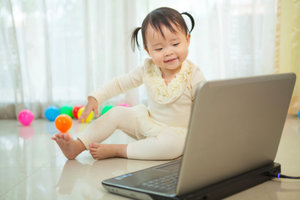
On one hand, we have the AAP (American Academy of Pediatrics) recommending that children under two should not be exposed to any screen time whatsoever, suggesting that any educational content in programmes could only be understood by children above two years of age, and warning that too much TV watching could lead to delays in language development and other developmental issues.
For children over the age of two, the AAP suggests limiting exposure to screen times to one to two hours a day, with preferences for active screen time such as interactions with other people on Skype to passive screen time.
A recent UCLA study also found that screen time could negatively affect a child’s ability to read people’s emotion:
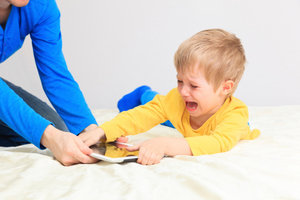
Some parents take the no-screen rule very seriously. I remember meeting these new parents who brought their four-month-old to a family gathering I was at. While everyone sat eating and chatting in the open plan dining/living area, they were shifting around and fussing with their baby, moving him from one arm to another, one parent to the other, just so that they could avoid his eyes making contact with the TV screen that was ten feet (about three metres) away. When I asked the parents (who are ironically the most tech-savvy people I know) how they dealt with having smart phones around their infant, they proudly reported that they would never use smart phones around him except when he was having a nap.
This might be a rare example of parents going out of their way to ensure that their babies are not exposed to any screen time but it certainly throws light on the growing awareness of the damaging effects overexposure to screens and mobile devices could have on children.
Even techies like the late Steve Jobs and Evan Williams, founder of Blogger and Twitter and former Wired editor Chris Anderson have been reported to strictly limit their children’s exposure to screens. And there recently been a flurry of reports like this one in the NY Times and this blogpost on NPR’s website that are cautioning modern parents of the dangers of a high-tech upbringing.
So how can a mum like me not be worried?
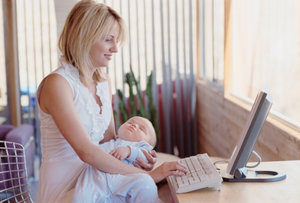
But among all the worrying, we have reality. The TV, our laptops, our smart phones, and our tablets are part of our everyday life. To artificially eradicate the use of all these devices when our under-twos are present in the room could serve to give them a misguided view of modern living. The ‘babysitter effect’ of screens is an undeniable one. Those without kids might frown upon it but those with kids might sympathise with the need to plop a child in front of the TV or an iPad for 30 minutes while one gets the dinner ready.
Despite AAP guidelines, a recent survey found that 90% of parents with children under age two do allow some engagement with electronic media for an average of about one to two hours a day but one hopes that a balanced approach is being taken: one where mobile devices are not used to replace imaginative play and roleplaying, all essential processes to help the child make sense of the world around them; one where socialization is not stunted and children will still be able to develop their social skills, maintaining conversations at the dinner table and learning to listen and pay attention for extended periods of time.
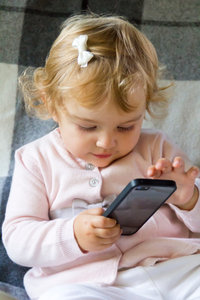
In a survey by San Francisco-based non-profit Common Sense Media, it was found that 40% of families with children aged eight and under now owned tablets like iPads, compared to 8% just two years ago. And the average child uses tablets…wait for this… seven hours a day! It is therefore more essential than ever to seriously consider the way we are using technology with our very young children.
It is not uncommon to see very young children flicking and tapping away on their iPads, oblivious to all that is happening around them. And they seem to be getting younger and younger everyday. My friend’s one-and-a-half-year-old is able to open the YouTube app, find her favourite music video and play it. I suppose this is not entirely surprising when you consider the fact that all three of my friend’s children have their own tablets and it is not uncommon to see the four of them sat side by side engrossed in their own tablet worlds.
And the prevalence of technology’s influence on very young children is seen in many other areas. My niece who is very used to seeing her Canadian grandparents on Skype was initially surprised at the absence of a video image when she first talked on a telephone. Many of my friends and relatives have Facebook accounts started in their babies’ names so that by the time they grow up, they would have Facebook identities, along with photos and status updates, already pre-determined for them.
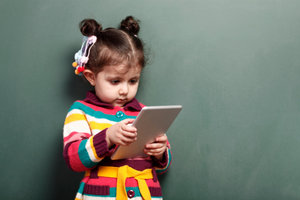
How would such use of technology affect the way our brains and bodies develop? How would it impact on the way we relate to other people and the way we behave in social situations? Would it one day become acceptable to have our heads in our mobile devices while at dinner with a friend? If so, why are we bothering with disciplining our children for using their smart phones at the dinner table? Maybe we should instead spend this time teaching them to multi-task? Is such multi-tasking even possible for children? Will your four-year-old be able to listen to you while playing his/her game on her tablet?
So many questions arise as I think about these issues, and the questions seem to beget more questions. Evidently, the conclusions I come to would be my own, and the decisions I choose for my child would be different from the decisions that other parents have made.
As a result, the relationship my child has with technology and with screens might be distinctly different from the relationship other children have with technology. Thus when a teacher chooses to use technology in the classroom, are they consciously taking into account such differences?
Would less tech-savvy children be penalized or be at a disadvantage for the upbringing their parents have chosen for them? Would more tech-savvy children operate on a level that ‘digital immigrant teachers’ like myself have trouble catching up with? Would able multi-taskers be allowed in class to carry out the task given by their teachers while conducting a chat with their friends on Facebook?
I know that these children I am referring to aren’t necessarily very young learners (VYLs) as such, but simply very young people. But could the thoughts and concerns of the parent like me sway how technology could be used both in the classroom and for homework?



Comments
Write a Comment
Comment Submitted